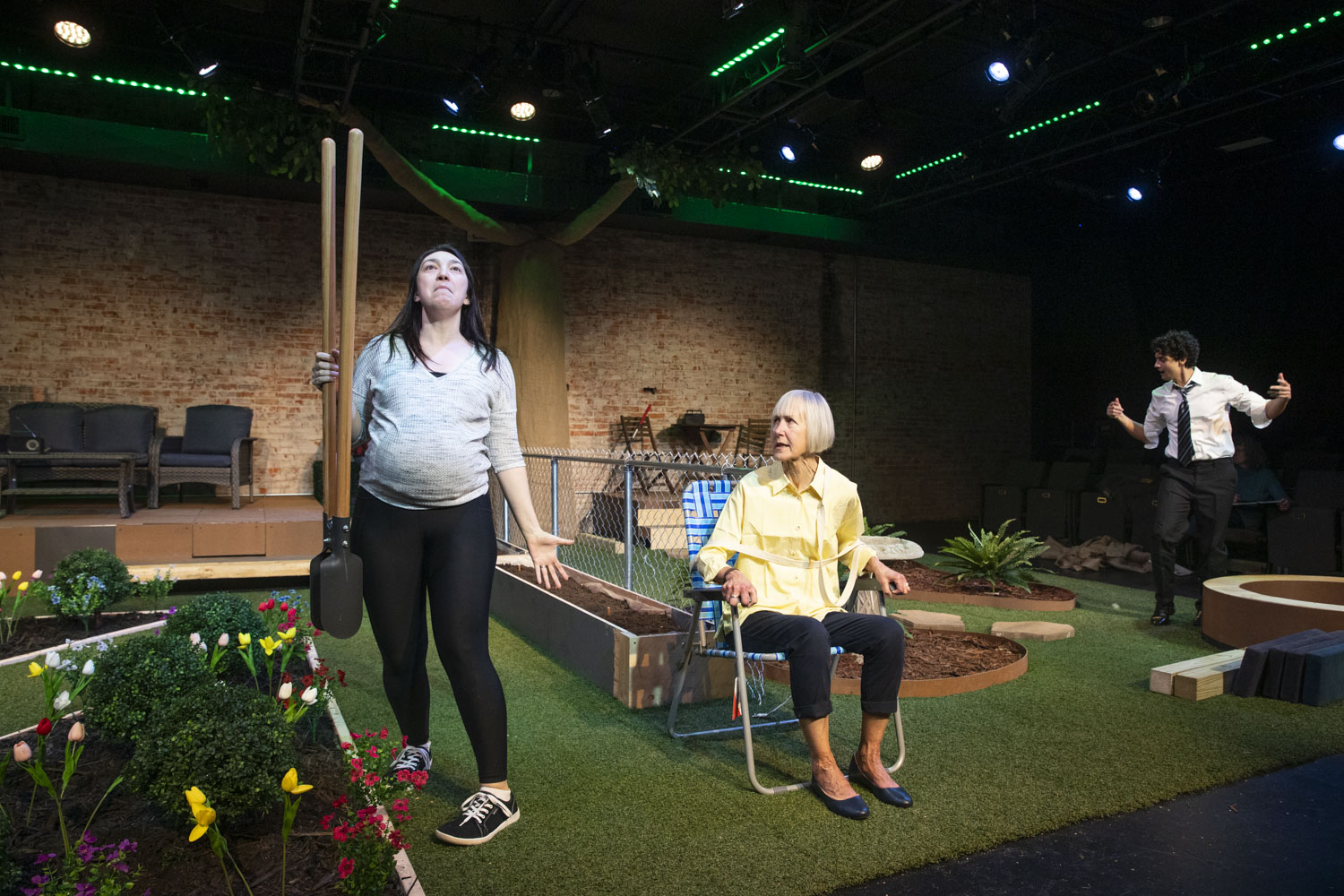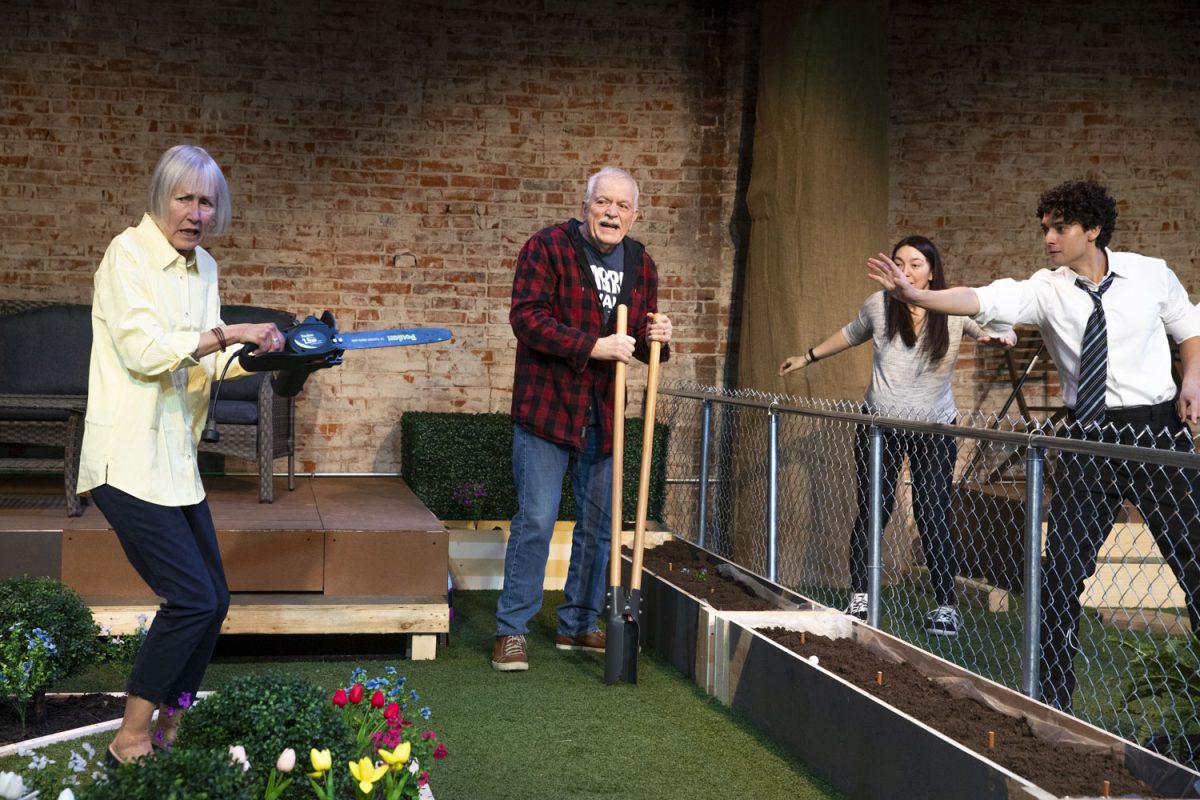Orchestrating a play is no easy task, especially when constructed on the professional level Riverside Theatre strives for. After weeks of work and development, the theater will open its 300th production, “Native Gardens,” on Feb. 28.
It’s a milestone show for Riverside that only adds to the pressure in the air in the rehearsal space. In the weeks leading up to the big opening, actors and crew tinker with their roles to make “Native Gardens” as funny and heartfelt as possible iteration after iteration.
Tensions rise on the back porch of a Washington, D.C., home as a young married couple looks out at their inadequate yard and agonizes over problems they never thought they would have to solve.
Pablo Del Valle, an up-and-coming lawyer from Chile, stands at the edge of the porch as he argues with his pregnant wife Tania. The pair are in the middle of a garden border dispute that could change their lives. Hesitant at first, Tania is devoted to fighting for her land.
This scene is gripping, moving, and clever. And yet, something feels off.
What would the scene be like if Pablo was more persuasive than argumentative? How would it change if both halves of the couple stood in their garden rather than on the porch set?
Kirsten Brooks, the director of Riverside Theatre’s “Native Gardens,” has asked herself questions like these frequently since rehearsals began on Feb. 4. Franco Machado-Pesce and Jessica Murillo Kemp, who play Pablo and Tania, respectively, ran through the same scenes multiple times in response to Brooks’ questions.
“When I’m watching the scene, I’m looking to see what about the story is coming across and how the movements and vocal intonations are related,” Brooks said.
This meticulous trial and error is often the unseen aspect of the play production process.
Natanael Payán, who works on the show as the assistant stage manager and ensemble cast member, focuses on the production with both roles in mind. He thinks about honing his character and actively keeps his eyes on every detail of the show.
“Since this show is so prop-heavy, there’s a lot of little things to keep track of, especially when I’m the one going in and out during a transition,” Payán said.
However, trying to discover the balance between acting and stage management has been worth it for Payán. Through the show’s development, Payán has enjoyed developing his ensemble character, an immigrant who helps run a landscaping business.
Though Payán’s character is not the story’s focus, the work he puts into the character helps bring him to life and enriches the entire show.
As tweaks are made to character interactions by the play’s director and stage managers, the actors’ perceptions of their roles evolve.
Ron Clark and Jody Hovland, Riverside’s founders who now work as freelance actors, returned to the stage to play Frank and Virginia Butley in “Native Gardens.” Clark and Hovland have enjoyed seeing the growth of Riverside over the years — from a bare stage and small staff to a thriving hub for the arts.
According to Clark, reading, re-reading, and researching the script is where he always starts before trying to play a new role, sometimes months before rehearsals begin. For Clark, if an aspect of his character is not justified or supported by the script, it does not need to exist.
“I’m not going to invent the fact that Frank was in prison for 15 years — there’s nothing to suggest that,” Clark said. “But there are things that are suggested. Frank grew up wealthy, and Virginia didn’t. That’s interesting.”
After getting a good grasp on their characters’ identities, actors must also learn and adapt to other actors around them who also have a unique vision of who their characters should be.
New ideas spawn in table readings when actors sit at a table across from one another and go line-by-line through their scripts. In this space, acting transforms into a collaborative process.
“Our characters would be slightly different if we played across from different actors. That’s what makes each production,” Hovland said. “That’s why we see ‘Romeo and Juliet’ hundreds of times — because there’s a different collection of actors and directors.”
Machado-Pesce is thrilled to be at Riverside working with the theater’s founders. He traveled a long way to be a part of this legacy.
The young actor currently lives in and works in New York, but when the opportunity came to be part of Riverside’s 300th production, he couldn’t turn it down.
“It’s phenomenal to be a part of this production. It’s such an immersive set as well, so I feel like it’s such an enjoyable experience, not just as an actor, but also to participate with the audience so closely,” Machado-Pesce said.

Most people think of theater as watching a story from afar, looking down on the actors from the seats rising above the stage. However, Riverside’s theater presents a very different experience. The theater consists of three sections of seats surrounding the stage. But the stage is not elevated at all save for the two porches in the families’ yards. The audience is on the same level as the actors, mere feet away from the story. It brings the audience closer to the characters strolling through the gardens.
“It’s such a different layout. In traditional theater, we have to be aware of our positioning, making sure we’re not blocking and just sending our backs to the audience,” Machado-Pesce said. “It makes a lot more sense to play and feel free to move around the set as much as possible.”
Beyond the beautiful mise-en–scène, “Native Gardens” strikes very relevant notes in today’s social climate, as it deals with themes of identity struggle regarding race, gender, sexuality, career, and age. The themes are important to Machade-Pesce because of his Venezuelan heritage.
“As much as it touches on race and political ideologies, it’s really about two people who are right in their own way but don’t listen to each other. You realize so many issues come up from this idea of not wanting to listen to each other,” Machado-Pesce said. “As a Latino, I think it’s an honor and a privilege to be part of a play where Latino characters aren’t stereotypes.”
RELATED: The Stanley Museum of Art’s new exhibit ‘it’s a fine thing’ explores underexposed community
Ariana Martinez, a member of the ensemble, feels similarly grateful for this depiction.
“I’m first generation, so I’m familiar with these issues when it comes to parents who have opinions about what it means to come here legally, what it means to fulfill an American dream, what it means to assimilate,” Martinez said. “I hope the audience learns from watching the show to be mindful of the directions that we go, whether left or right. They can take us further and further away from talking and knowing each other.”
As rehearsals went on, actors’ perceptions of their characters changed. Through interactions with fellow actors and read-throughs of the script, Clark discovered Frank Butley is more vulnerable than he originally thought.
At one point during the play, Virginia said gardening has helped to deal with Frank’s chronic stress. At first, Clark claimed the stress on Frank wasn’t that bad. But as he spent more time in the character’s shoes, he thought about it more.
“What does chronic stress do? Has he had a panic attack? I thought about that and how when he seems angry, he’s scared, so maybe he’s had a health scare in his history,” Clark said. “That enriches the character.”
“You rely on the director’s eyes, too, to give feedback to you because you might think you’re sending out one thing, and the director says that’s not how it’s playing,” Hovland added.
While acting, Kemp tries to imagine what her character’s life would have been like before the events of the play. Her first impressions of Tania have shifted as a result of this exercise. Kemp began reading deeper into the subtext of her lines.
“Lines aren’t always necessarily just saying what you mean,” Kemp said. “Sometimes, we don’t quite get that during the first read around until we start working with the character, and we find other motivations for why they say what they do and do what they do.”
For this play in particular, Kemp has considered how being Hispanic may have affected her character, especially as she is living beside wealthy white neighbors.
“Normally, we don’t think of these things from an American perspective. We tend to stereotype,” Kemp said.
Seeing the perspectives of each character, such as Kemp’s Tania, and recognizing their good intentions despite their actions is at the heart of “Native Gardens,” a play that shows how a group of people mend fences, so to speak.
“We have all these things that — consciously or unconsciously — shut off our willingness to be open and vulnerable and make that human connection,” Brooks said. “A lot of the time, I think we don’t even know what’s happening. How do you get around that, if it is possible?”
For Brooks and the cast and crew around her, “Native Gardens” tackles the divides that form between human beings and the assumptions people can make about one another.
“This is a play that young audiences will love,” Clark said. “They will see a microcosm of the world before them in a very humorous way. Their generation is portrayed by a pair of beautiful young actors, and we have an ensemble I’m very proud of. They do great stuff and are working extremely hard.”



